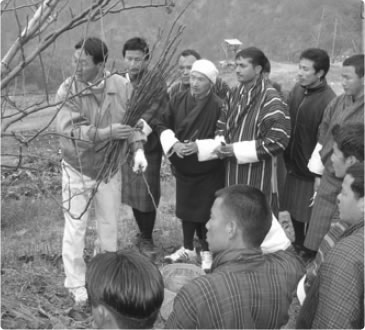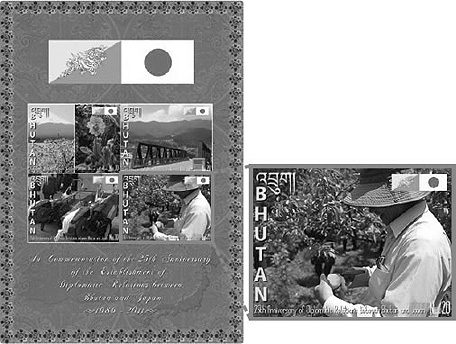Japan's Official Development Assistance White Paper 2011
Column 8
Practice Through Action: "Farming as a Job"
—Agricultural Assistance in Bhutan—

Mr. Tomiyasu (left) providing training (Photo: JICA)
Yuichi Tomiyasu is the project leader at an agricultural experiment station in Bhutan that receives visits from not only government workers but also the minister of agriculture and sometimes even Her Majesty the Queen. To any visitor, Mr. Tomiyasu shows well-grown fruits and vegetables, explaining that they are the collective efforts of all staff workers, and introduces the visitor to each worker. The Bhutanese workers are grateful of Mr. Tomiyasu's thoughtfulness when he expresses the project's achievements as not "my efforts" but "our efforts."
Bhutan is situated in a mountainous region south of the eastern Himalayas. Its main industry is agriculture, but because the small farmlands are scattered across steep slopes, it is no easy task to improve productivity. The farming villages in eastern Bhutan are particularly poor, and a big problem in recent years is the increasing number of youths who move to cities to make a living. To counter this problem, the Bhutanese government has launched a project to commercialize garden crops like fruits and vegetables in an aim to raise farmers' income(*1). Mr. Tomiyasu has been working in eastern Bhutan for more than ten years since 2000, training farmers in the cultivation of fruits and vegetables, and through it, raising their income. Through these activities, he has won the strong trust of the Bhutanese government.
Up to now, many of Bhutan's farmers worked solely for self-sustainment. As such, they were not all that keen on raising "good" crops for selling. There was no standard as to what "good" fruits or vegetables are to begin with, and for the first time, they were faced with the question of what cultivation techniques to employ for raising sellable fruits and vegetables. The project trains these farmers in cultivation techniques. Whereas in the past the Bhutanese farmers simply planted fruit trees and then left them alone until harvest, the project teaches them to prune the trees and thin out fruit so as to grow a better crop. Also important is to incorporate new, attractive varieties suited to Bhutan's climate and soil. The native Bhutanese pear is only as big as an egg, and the flesh is hard, scant, and not very sweet. The farmers who participated in a training session saw the Japanese pear for the first time at the experiment station, and were surprised at its large size and plentiful and sweet flesh. After training, farmers who so wished went on to cultivate the variety in their own land. The project teaches them the skills to employ at each stage up to harvest. These sessions are held not only for fruit trees but also for vegetables like cabbage, cauliflower, broccoli, daikon radish, carrots, leaf mustard and shiitake mushrooms.
Mr. Tomiyasu is a man of few words, but he is always the first to act. By watching his actions, the staff workers learn farming skills along with other important qualities in performing a job. If a worker suggests something new, Mr. Tomiyasu encourages him to try it and offers praise for work well done. This method has fostered a sense of responsibility in the workers and a culture of competing with each other and building on good practices. In this way, Mr. Tomiyasu requires the workers to be independent, spontaneous, and earnest in their job. However, if a farmer neglects a seedling he has taken the trouble to plant, Mr. Tomiyasu threatens to cut down the seedling to encourage the farmer to take his job seriously. Through farming, Mr. Tomiyasu in fact teaches the right attitude in approaching one’s job.
Thanks to Mr. Tomiyasu's leadership and devotion to the project, new varieties have appeared on the market—the Japanese pear and vegetables like broccoli, cauliflower, and carrots. A number of farmers who have taken on the challenge of "farming as a job" have set a goal to grow higher quality fruits and vegetables, and started trying their hand at new things like producing vegetable seeds. Above all, some of the youths who had left for the city to work as civil servants or as employees at the electric power company, upon hearing about the project, have returned to do farming work in their home village.
Mr. Tomiyasu's steady, down-to-earth activities have earned the trust of the farmers around him, and are welcomed by officials of the Bhutanese government too. In May 2011, to celebrate the 25th anniversary of Japan–Bhutan diplomatic relations, the government issued a commemorative stamp depicting Mr. Tomiyasu working at a farm.
(*1) Horticulture Research and Development Project

Commemorative stamp issued by the Bhutanese government in honor of the 25th anniversary of Japan–Bhutan diplomatic relations
Clockwise from top left: national flowers of Bhutan and Japan, bridge donated by Japan, Mr. Tomiyasu providing agricultural training, tractors donated by Japan
